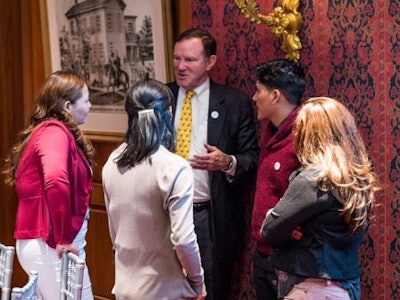 Donald Graham and students at TheDream.US launch event in Washington, D.C. (courtesy of TheDream.US)
Donald Graham and students at TheDream.US launch event in Washington, D.C. (courtesy of TheDream.US)Since George W. Bush’s presidency, the prospect of immigration reform has meant that undocumented students would one day gain the opportunity to freely pursue higher education in the U.S.
Though the forecast for immigration reform remains uncertain under the Obama administration, progress was made last week when San Antonio Democratic activist Henry Muñoz III, former Washington Post CEO Donald E. Graham, and Carlos Gutierrez, a Commerce Secretary under President Bush, announced the establishment of TheDream.US, a national scholarship fund aimed at assisting undocumented immigrant students in paying for college.
Currently, students who were brought to the U.S. as minors with their undocumented immigrant families are not eligible to apply for federal financial aid to fund a college education. These undocumented students have become known as “DREAMers,” which emanates from the proposed Development, Relief, and Education for Alien Minors (DREAM) federal legislation.
“With support from our partner institutions and from civic leaders across the country, TheDream.US is building a new movement to remove these roadblocks and make higher education a reality for thousands of undocumented immigrants,” TheDream.US co-founder Donald E. Graham said in a statement. “We’re making a down payment on our country’s future by helping these young Americans achieve the American Dream.”
Over the next decade, TheDream.US fund will provide college scholarships to enable more than 2,000 low-income DREAMers to complete college. Last week, it was announced that 39 students with an average GPA of 3.5 had received scholarships. Twelve higher education institutions have signed on as partners with the TheDream.US organization, and they are expected to support the aspirations of DREAMer-scholars. Twenty-two of the 39 scholarship students attend Miami Dade College (MDC), one of the 12 partner schools.
On Tuesday, MDC president Dr. Eduardo J. Padrón met with the 22 MDC students who are in the inaugural scholarship recipient class. During a campus ceremony with Graham in attendance, the students signed scholar commitment forms.
“We have to do something now. We’re not going to wait for Congress to pass immigration reform,” Maria Gabriela “Gaby” Pacheco, the program director for TheDream.US organization and MDC alumnus, told Diverse following the MDC ceremony.
TheDream.US officials say that more than $25 million has been raised from philanthropic and business leaders, including Graham’s family, from across the nation. Last year, the Graham family sold the Washington Post to Amazon.com founder and CEO Jeff Bezos. Scholarship fund supporters include the Bill & Melinda Gates Foundation, the Fernandez Foundation, Bloomberg Philanthropies and the Inter-American Development Bank.
Annually, an estimated 65,000 undocumented students graduate from U.S. high schools. A number of private colleges provide scholarships to undocumented students and 17 states now allow them to receive in-state tuition rates at public colleges, according to the Washington Post.
Eligible applicants for TheDream.US scholarships must qualify for the Deferred Action for Childhood Arrivals program (DACA), must have graduated from a U.S. high school with a GPA of 2.5 or higher, must demonstrate financial need and must show motivation to thrive in a career-ready associate’s or bachelor’s degree program. The scholarships cover up to 100 percent of a student’s total cost of tuition, fees and books. Scholarship recipients must maintain a cumulative 3.0 GPA, stay continuously enrolled and remain DACA eligible.
Deborah Santiago, the co-founder and vice president for policy and research at the Washington-based Excelencia in Education organization, described the establishment of TheDream.US program as a valuable initiative in bringing attention and resources to undocumented students.
“Knowing that not all but a lot of DREAMers are Latino means that we pay attention to the issues that affect them,” notes Santiago, whose organization is devoted to accelerating Latino student success in higher education.
“These are students who have qualified for DACA. They have followed all the steps they need to be able to work and to go to college and be successful. I think it’s important that they’ve identified students who have taken the right steps and try to support them,” she says.
Pacheco, a former DREAMer student, said that, even with passage of either the DREAM Act or comprehensive immigration reform, students once deemed as undocumented will likely face continued restrictions when applying for federal financial aid. “The [financial] need is still going to be there and the only difference will be that [previously undocumented students] will have legal status” under immigration reform, she said.


![Mentor Mentee [60287]](https://img.diverseeducation.com/files/base/diverse/all/image/2024/04/Mentor_mentee__60287_.662959db8fddb.png?auto=format%2Ccompress&fit=crop&h=100&q=70&w=100)


















